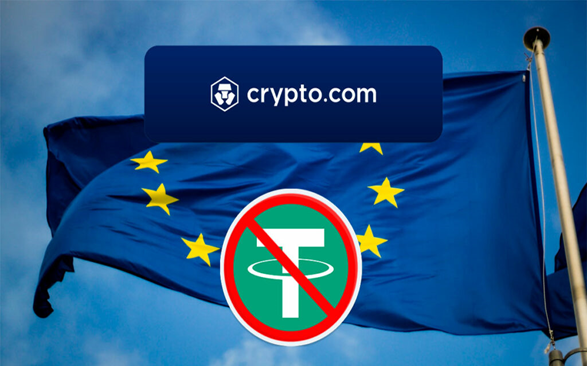by Jude Ayua
Coinbase has delisted Tether (USDT) and five other stablecoins in Europe, following its final announcement that these stablecoins would be deleted by 13 December 2024. This is because of the crypto exchange’s need to comply with the requirements of the European Union (EU)’s Markets in Crypto-Assets (MiCA) regulatory framework.
In a statement on 11 December Coinbase addressed to its clients, titled “MiCA Changes to Stablecoin Services,” the exchange wrote:
As a reminder, due to the new European Markets in Crypto-Assets (MICA) regulation, Coinbase will implement restrictions for stablecoin services that do not meet MICA requirements for Retail customers of Coinbase Europe Limited and Coinbase Germany GmbH. Restrictions will take effect at 11:59 CET on 13 December 2024.
Based on the latest information, we currently expect we will have to restrict services for the following assets: USDT, PAX, PYUSD, GUSD, GYEN, and DAI (together, the “MiCA-restricted assets”).
It’s important to note that USDC and EURC are MiCA-compliant and will continue to be supported on Coinbase.
The exchange gave its clients two options: “Sell or convert the MICA-restricted assets to USDC or EURC before the restriction date. Transfer the MiCA-restricted assets off our platform to a self-custody wallet under your control.”
This decision is a demonstration of the exchange’s commitment to compliance. “We regularly review the assets we make available to customers on our platform to ensure we are meeting regulatory requirements, and will assess re-enabling services for stablecoins that achieve MICA compliance on a later date,” the statement noted.
Read also: Coinbase to delist crypto assets in Europe market.
Coinbase stated the same commitment earlier in October: “Given our commitment to compliance, we intend to restrict the provision of services to EEA users in connection with stablecoins that do not meet the MiCA requirements by December 30, 2024.”
MiCA’s phased implementation, requiring full compliance by December 30, aims to establish stricter regulatory oversight for stablecoins, promoting transparency and stability within the European crypto market. Coinbase emphasized that delisted assets could return once they meet regulatory standards.
Read also: MiCA: OKX delists Tether (USDT) trading pairs for Users in Europe. What next?
Read also: How the EU is taking the lead in cryptocurrency regulation.
Market analysis and regulatory insights
There is an increased effort on stablecoins regulation as part of broader efforts in different jurisdictions to establish relevant frameworks for digital assets. Coinbase’s proactive decision to comply with the EU MiCA regulations shows its commitment to maintain access to the EU market, one of the world’s most advanced regulatory regions for crypto.
Unlike the stablecoins Coinbase will delist, MiCA-compliant assets like Circle’s USDC have a competitive advantage. Circle’s securing a MiCA-valid license and its recent partnership with Binance to accelerate USDC adoption further exemplify the competitive advantage of regulatory-compliant issuers.
Read also: Circle and Binance partner to boost global USDC and crypto adoption.
On the other hand, the delisting of USDT presents challenges for Tether, which industry players criticized for some time over transparency and reserve adequacy. Although Tether pledged to create MiCA-compliant solutions, its perceived opaqueness continues to raise questions among regulators and investors.
The MiCA regulations are a major shift that could redefine the stablecoin market in Europe, favoring issuers with compliance infrastructures and limiting those without them. For exchanges and issuers, this shift highlights the need for adaptation to emerging regulatory frameworks to secure their market positions.
Read also: Stablecoins for stable markets: Why regulators should put market stability first
Jude Ayua is a policy analyst at CAB. A lawyer, Jude is an associate at Infusion Lawyers where he is a member of the Blockchain & Virtual Assets Group. He is also a member of the Policy & Regulations Committee of the Stakeholders in Blockchain Technology Association of Nigeria (SiBAN). Jude reports and writes on crypto policy and regulations. jude@infusionlawyers.com
Discover more from Crypto Asset Buyer
Subscribe to get the latest posts sent to your email.




